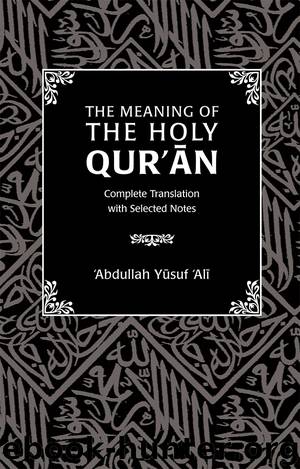The Meaning of the Holy Qur'an by Abdullah Yusuf Ali

Author:Abdullah Yusuf Ali
Language: eng
Format: epub
Publisher: Kube Publishing Ltd
Chapter 20
ṬĀ HĀ
Introduction
The chronology of the Sūrah has some significance: it has some relation to the spiritual lessons which it teaches.
It was used with great effect in that remarkable scene which resulted in ‘Umar’s conversion, and which took place about the seventh year before the Hijrah.
The scene is described with dramatic details by Ibn Hishām. ‘Umar had previously been one of the greatest enemies and persecutors of Islam. Like his bloodthirsty kinsmen the Quraysh, he meditated slaying the Prophet, when it was suggested to him that there were near relations of his that had embraced Islam. His sister Fāṭimah and her husband Sa‘īd were Muslims, but in those days of persecution they had kept their faith secret. When ‘Umar went to their house, he heard them reciting this Sūrah from a written copy they had. For a while they concealed the copy. ‘Umar attacked his sister and her husband, but they bore the attack with exemplary patience, and declared their faith. ‘Umar was so struck with their sincerity and fortitude that he asked to see the leaf from which they had been reading. It was given to him: his soul was touched, and he not only came into the Faith but became one of its strongest supporters and champions.
The leaf contained some portion of the Sūrah, perhaps the introductory portion. The mystic letters Ṭā Hā are prefixed to this Sūrah. What do they mean? The earliest tradition is that they denote a dialectical interjection meaning “O man!” If so, the title is particularly appropriate in two ways. (1) It was a direct and personal address to a man in a high state of excitement, tempted by his temper to do grievous wrong, but called by Allah’s Grace, as by a personal appeal, to face the realities, for Allah knew his inmost secret thoughts (20:7): the revelation was sent by Allah, Most Gracious, out of His Grace and Mercy (20:5). (2) It takes up the story from the last Sūrah, of man as a spiritual being and illustrates it in further details. It tells the story of Moses in the crisis of his life when he received Allah’s Commission and in his personal relations with his mother, and how he came to be brought up in the Pharaoh’s house, to learn all the wisdom of the Egyptians, for use in Allah’s service, and in his personal relations with Pharaoh, whom we take to be his adoptive father (28:9). It further tells the story of a fallen soul who misled the Israelites into idolatry, and recalls how man’s Arch-enemy Satan caused his fall. Prayer and praise are necessary to man to cure his spiritual blindness and enable him to appreciate Allah’s revelation.
Summary—The revelation of Allah (the Qur’ān) is not an occasion of distress, but is a gift of mercy from Allah Most Gracious (20:1-8).
How Moses was first chosen, and led to his mission to Pharaoh with his brother Aaron (20:9-36).
How the mother of Moses was directed to cast the infant Moses into
Download
This site does not store any files on its server. We only index and link to content provided by other sites. Please contact the content providers to delete copyright contents if any and email us, we'll remove relevant links or contents immediately.
| Hadith | History |
| Law | Mecca |
| Muhammed | Quran |
| Rituals & Practice | Shi'ism |
| Sufism | Sunnism |
| Theology | Women in Islam |
The History of Jihad: From Muhammad to ISIS by Spencer Robert(2618)
Nine Parts of Desire by Geraldine Brooks(2358)
The Turkish Psychedelic Explosion by Daniel Spicer(2353)
The First Muslim The Story of Muhammad by Lesley Hazleton(2265)
The Essential Rumi by Coleman Barks(2042)
1453 by Roger Crowley(2022)
The Last Mughal by William Dalrymple(1855)
Trickster Travels: A Sixteenth-Century Muslim Between Worlds by Davis Natalie Zemon(1840)
Muhammad: His Life Based on the Earliest Sources by Martin Lings(1644)
God by Aslan Reza(1639)
by Christianity & Islam(1627)
A Concise History of Sunnis and Shi'is by John McHugo(1566)
No God But God by Reza Aslan(1539)
Magic and Divination in Early Islam by Emilie Savage-Smith;(1533)
The Flight of the Intellectuals by Berman Paul(1501)
Nothing to Envy by Barbara Demick(1445)
Art of Betrayal by Gordon Corera(1429)
What the Qur'an Meant by Garry Wills(1391)
Getting Jesus Right: How Muslims Get Jesus and Islam Wrong by James A Beverley & Craig A Evans(1338)
